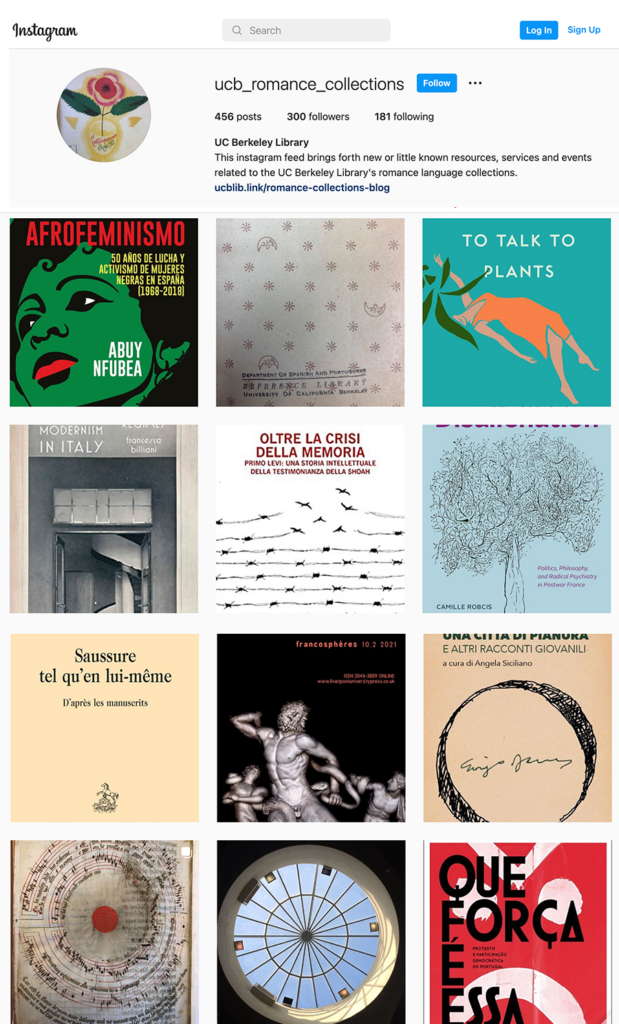Tag: social media
Check out the Romance Language Collections on Instagram
The Romance Language Collections Instagram feed brings forth little known and new resources and services in the UC Berkeley Library. Once you start following you’ll instantly receive early notices of new books, e-resources, exhibits, readings and more through your smartphone or any web browser.
A LAUC-B Conference to Remember!

LAUC-B is the Berkeley chapter of the Librarians Association of the University of California, and it helps us librarians in so many ways. When we come to campus to interview, we have lunch with LAUC-B representatives (and the conversation is confidential, so we can ask the REAL questions we have). When we arrive as new librarians, LAUC-B connects us with mentors. It provides support for our promotion and review process, and it provides a strong sense of community as we navigate this complicated campus.
One important thing LAUC-B does is offer professional development sessions, culminating in its conference every two years. The 2021 conference (which we posted about here the other day) just concluded, and multiple attendees, from all over the country (and even internationally) said that it was the best one they’ve attended in the past year (just to pat ourselves on the back a little bit!). So, what does a great librarian conference look like?
First of all, it takes a village; this year, for the first time, we Berkeley librarians welcomed librarians from other UC campuses to help us, and we had planning committee members from UCLA, UC Irvine, and UC San Diego. Second, it takes communication; in the online world created by the pandemic, at the same time we both needed to get the word out widely, and we were able to, by using email lists, social media, and other channels. This was so important, because the conference content—which was amazing—depended on us reaching a range of people and settings and locations. Third, it takes flexibility (with a large dose of preparation)! The planning committee was taking the conference from its historical in-person format to happening online for the first time, and that came with many challenges, even given the wonderful support from the Library Events Department—we changed conference platforms at the last minute, we became experts at Zoom bombing prevention, and learned more than we thought possible about captioning so that we could be ADA compliant.
The title of the conference is “Reimagining Libraries Through Critical Library Practices”, and our description notes that: “Library work is embedded in and inherently tied to socio-political circumstances. The programming in this conference examines librarianship through the lenses of social justice, diversity, equity, inclusion and anti-racist work, Black studies, Latinx studies, Indigenous studies, cultural and critical ethnic studies, intersectional feminism, critical disability studies, postcolonial and decolonial studies, and queer interventions in digital studies.”
We felt extremely fortunate that the proposals we received were so on point and so strong and deep, including: invited keynote presentations from Clara Chu and Lalitha Nataraj; 6 additional featured presentations; 5 lightning talks; and 11 posters (with which attendees had two different time slots to engage). Many of the presenters included a land acknowledgement and/or a positionality statement as they began their talks, engaging the attendees to consider their own locations and positions, and the UC Berkeley statement included this Rematriation Resource Guide from the Sogorea Te’ Land Trust. Attendees also agreed to uphold the conference’s Code of Conduct Statement.
If you’d like a sense of the 2-day event, please take a look at the conference website, and also at our Twitter hashtag. Session recordings will soon be available, linked on the website and hosted on the Library’s YouTube channel. Also notable were the elegant design offerings, including the logo you see above, which were created by UC Berkeley Library staffer and graphic designer Sarah Chieko Bonnickson, as well as the atmospheric and stress-reducing playlist, which was relayed between sessions and about which people raved, by UC Berkeley librarian Kristina Bush. If you have questions or comments, feel free to contact us at laucbconfinfo [at] lists.berkeley.edu, and please enjoy the Twitter screenshots below, while we enjoy our (distanced) celebratory beverages!
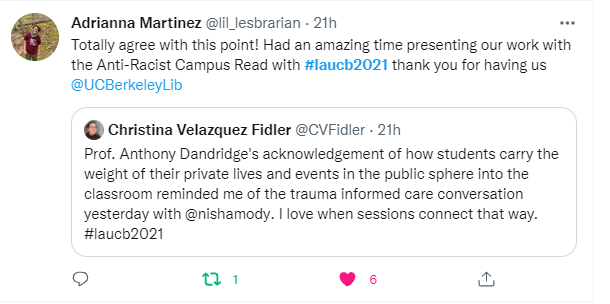
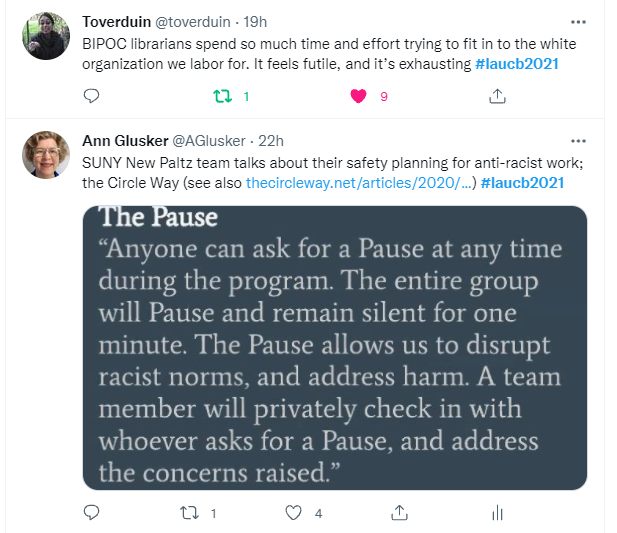
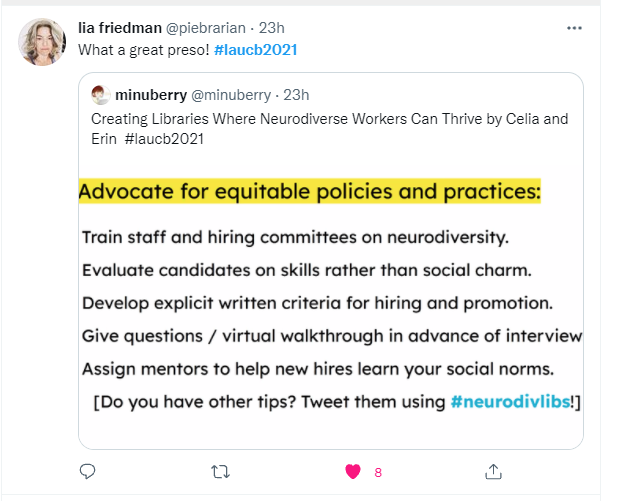
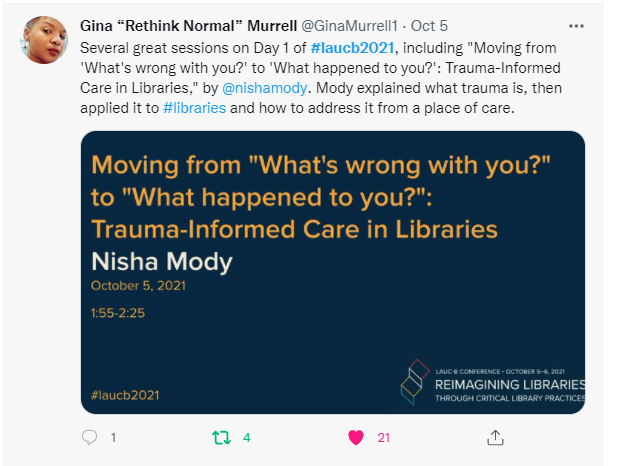
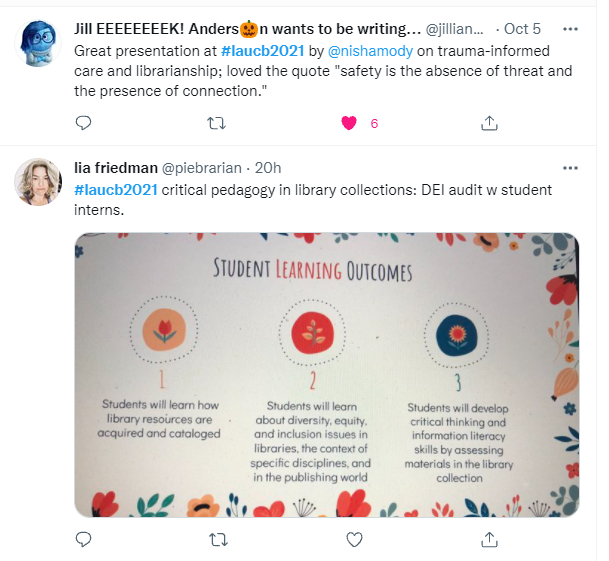
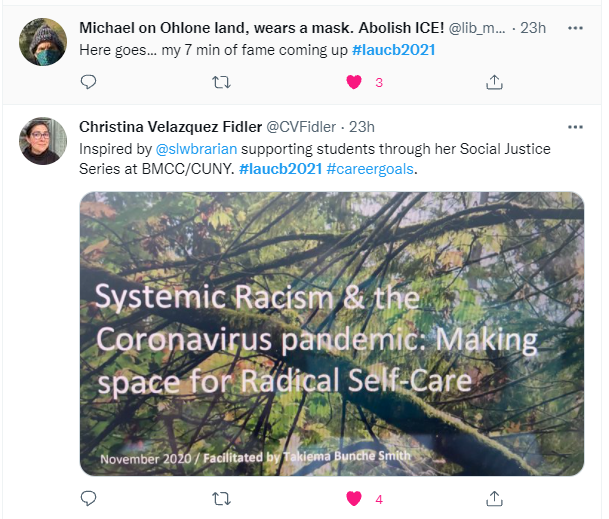
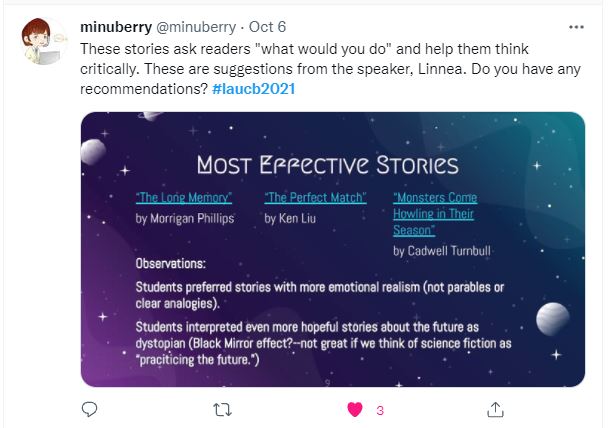
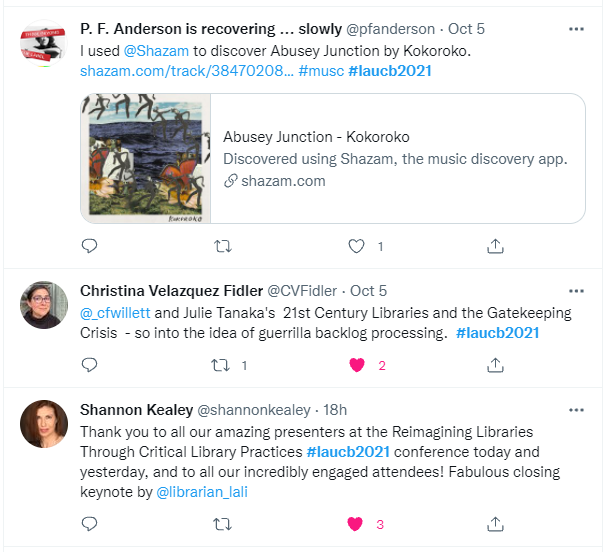
Law & ethics in research and archiving social media of Myanmar resistance
On March 9, 2021, the Center for Southeast Asian Studies, Institute of East Asian Studies, the Institute of South Asia Studies, and the Human Rights Center at UC Berkeley hosted the online symposium Scholar-Activism and the Myanmar Resistance. The event invited scholar-activists to analyze and strategize for resistance to Myanmar’s military coup. The Office of Scholarly Communication Services collaborated with Dr. Hilary Faxon, Ciriacy-Wantrup Postdoctoral Fellow at UC Berkeley, to organize an afternoon workshop to explore the law, ethics, methods, and goals of archiving social media coverage of the coup.
Faxon highlighted that in the months since the military seized power on February 1, the internet has become a key domain of struggle in Myanmar. The military has cut off internet access and (before being banned) used Facebook to disseminate misinformation. Meanwhile, democracy activists have used social media alongside traditional tactics of street protests and general strikes to resist the regime.
The workshop brought together a diverse group of participants from across and beyond campus with perspectives from human rights, research and journalism, including WITNESS and Berkeley’s Human Rights Investigation Lab. Stacy Reardon, Literatures and Digital Humanities Librarian, discussed services and workshops offered by Digital Humanities at Berkeley, as well as tools used to conduct DH research, such as the Wayback Machine, Conifer, 4k download, Adobe Bridge, and others.
The Office of Scholarly Communication Services provided an overview for how to navigate law and policy issues when researchers are scraping, archiving, or text mining third party content, like social media posts, website text or images, or articles from databases. We addressed common issues that arise in research and archiving, including copyright, license agreements and website terms of use, privacy questions, and ethical considerations.
Workshop discussions were centered around a commitment to a shared ethics of care approach to using, sharing, and archiving information social media content related to the coup. The ethics of care framework suggests that what we do as information collectors or analyzers will affect other people, particularly when people have less structural power, and according to the ethics of care, we should care about that. This becomes immediately apparent when deciding whether or how to collect, process, and share potentially sensitive social media posts, images, and videos from the Myanmar coup, especially when doing so could have dire consequences for activists who are the subjects of those posts.
During the workshop, we talked about how the Library has adopted a form of ethics of care in our approach to making decisions about what collection materials we’ll digitize and put online. Our version of ethics of care is framed as a balancing principle: that is, we look to whether the value to researchers, the public, or cultural communities in digitizing and sharing the content outweighs the potential for harm or exploitation of people, resources, or knowledge.
Several takeaways emerged by the end of the workshop discussion:
- Protecting and defending human rights: Archiving material from social media—including videos, photos, and live streams—might help ensure perpetrators of violence are held accountable, but the production and circulation of such materials can also be highly-incriminating for media creators and platform users.
- Collecting is collaborative: Usage of archives is bound up with the intentions of those creating material, and so archiving requires an ongoing, bi-directional conversation between those creating content and those doing the archiving.
- Circumstances change: Both ethical and organizational approaches should be discussed and decided in advance of archiving. But expect situations to change – what is safe and straightforward to keep today may be more risky tomorrow.
- Capturing versus sharing: These are different processes, and “archiving” does not necessarily have to entail both. The benefits and risks associated with collecting data are distinct from those associated with sharing data or making it publicly available, so these processes should be considered separately.
- Law and ethics: Regardless of what is allowed under U.S. copyright law, there may be other contracts and terms of service that restrict what you can do with materials. Moreover, collecting voluntarily-released data may not violate legal privacy rights, but may present ethical questions.
- Data security: Develop a Data Management Plan that addresses organization and protection both during archiving, and after the project is completed. Consider a special purpose account for collaborations and data sharing.
- Data hygiene: Don’t collect more than you need.
- Practical strategies: Tools may depend on the specific goals of a researcher and the scale of the project. It is important to ask what, precisely, you mean when you say “archiving,” and what the purpose of creating your archive might be.
- Seek out a community of practice to support and situate your efforts.
We hope the workshop helped researchers to better understand the legal and ethical considerations in collecting, processing, and sharing potentially sensitive social media content of events like the Myanmar resistance. The Library and a broad community of supporters are here to help scholars address these challenges and equip them to proceed with confidence, care, and sound practices.
